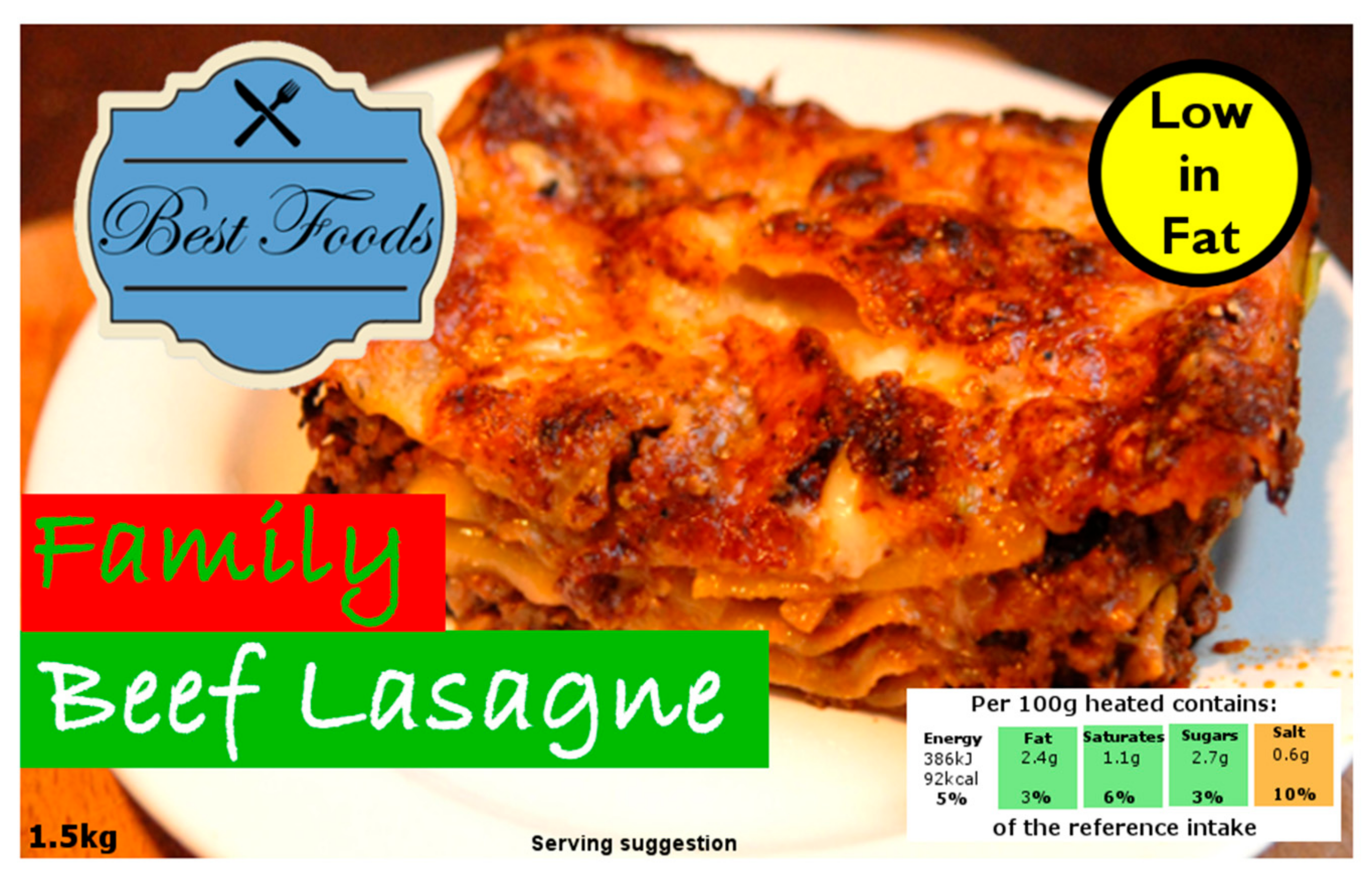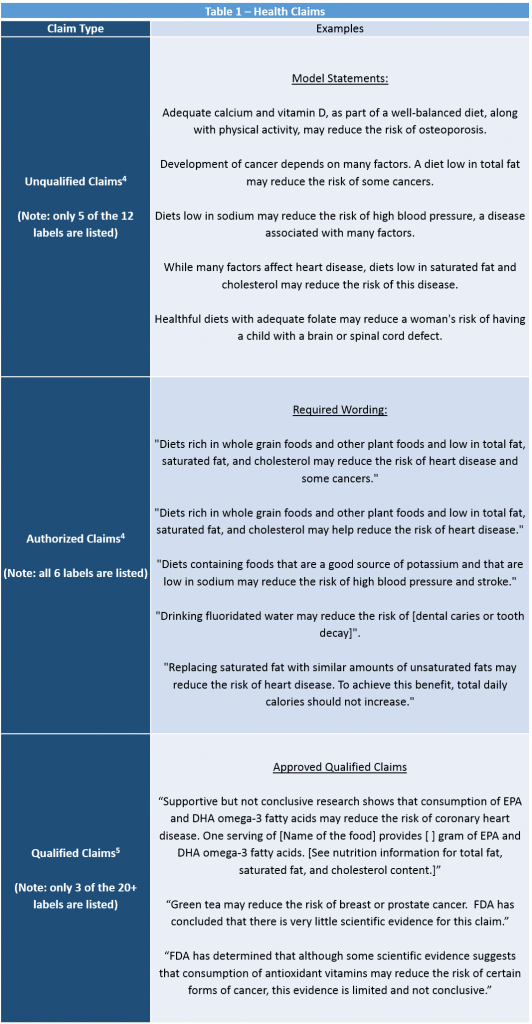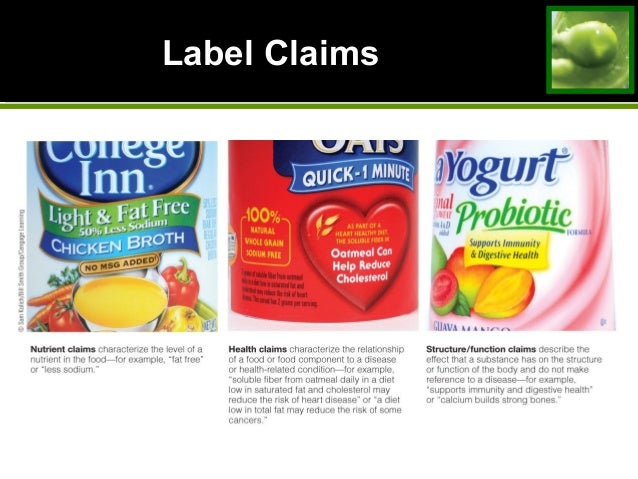40 health claims on food labels australia
Labelling Guidance - Australian ... - Australian Beverages Nutrition content claims and health claims are voluntary statements made by food businesses on labels and in advertising about a food. Standard 1.2.7 sets out the rules for food businesses choosing to make nutrition content claims and health claims. Nutrition labels and claims in New Zealand and Australia ... Methods: 1,262 food labels from products on sale in Australia and NZ in 2003 were examined. Results: 43% products carried nutrition or health claims. More products featured nutrition claims (42%) than health claims (11%). 40% health claims were NHF endorsements and 23% were function claims. Author, year, country: Williams, 2003, 28 Australia
PDF Getting Your Claims Right - Food Regulation All food businesses, including importers, in Australia and New Zealand must comply with Standard 1.2.7 when making nutrition content claims and health claims on food labels, in advertisements and in endorsements on food. The diagram on page 4 can help you consider whether Standard 1.2.7 applies to any claims made.

Health claims on food labels australia
Health, nutrition and credence claims - food marketing and ... The new Standard 1.2.7 - Nutrition, Health and Related Claims regulates the voluntary nutrition and health content claims that food businesses can make on labels and in advertising. The goal of the... Health and nutrition claims - NSW Food Authority Health and nutrition content claims are voluntary statements made by food businesses on labels and in advertising about the health benefits of the food and need to meet the criteria set out in the Food Standards Code. Health claims refer to a relationship between a food and health. Australia New Zealand Food Standards Code - Standard 1.2.7 ... Standard 1.2.7 Nutrition, health and related claims. Note 1 This instrument is a standard under the Food Standards Australia New Zealand Act 1991 (Cth). The standards together make up the Australia New Zealand Food Standards Code. See also section 1.1.1—3. Note 2 The provisions of the Code that apply in New Zealand are incorporated in, or adopted under, the Food Act 2014 (NZ).
Health claims on food labels australia. Diet and nutrition health advice | Dietitians Australia As the leading voice of nutrition in Australia, we're helping build healthy communities. Read our advice to learn how diet and nutrition can improve your health and wellbeing. Evidence-based health advice. Our growing library of health advice articles feature the latest scientific evidence about human nutrition. Health-related claims on food labels in Australia ... Abstract Objective: Health and related claims on food labels can support consumer education initiatives that encourage purchase of healthier foods. A new food Standard on Nutrition, Health and Related Claims became law in January 2013. Implementation will need careful monitoring and enforcement to ensure that claims are truthful and have meaning. About food labels | Health and wellbeing | Queensland ... There are strict requirements about claims that can be made and how they should be written on a label. Nutrition content claims are claims about the content of certain nutrients or substances in a food. For example, contains calcium. Health claims refer to a relationship between food and health. For example, calcium for bone and teeth. Food labelling | NSW Food Authority New requirements for labelling the most common allergens in food commenced on 25 February 2021. The changes to the Food Standards Code will help people find allergen information on food labels more quickly and easily, so they can make informed and safe food choices. For more information see Changes to allergen labelling.
Regulating health claims on food labels using nutrient ... Proposed Australian regulation of claims on food labels includes requirements for products carrying a health claim to meet nutrient profiling criteria. This would not apply to nutrition content claims. The present study investigated the number and healthiness of products carrying claims and the impact of the proposed regulation. Design Nutrition content claims and health claims - Food Standards Health claims are only permitted on foods that meet the Nutrient Profiling Scoring Criterion (NPSC). For example, the Standard doesn't allow health claims on foods higher in saturated fat, sugar or salt. There are 2 types of health claims - general and high level. How effective is food industry self-substantiation of food ... food standard 1.2.7 (the 'standard' hereafter) on nutrition, health and related claims permits three types of claim on food labels: (i) nutrition content claims highlighting the presence or absence of a nutrient, e.g. 'contains calcium'; (ii) general-level health claims stating, suggesting or implying that a food or property of that food has a … How to understand food labels - Eat For Health Sometimes labels will include nutrition content claims like 'low fat', 'reduced salt' or 'high fibre'. These claims can only be used if the food meets certain criteria. For example, with a 'good source of calcium' claim, the food must contain more than a set amount of calcium.
Food labels - Better Health Channel There are only 13 pre-approved high level health claims that can be made in Australia. Voluntary labelling - Percentage Daily Intake (%DI) and Health Star Rating (HSR) Some manufacturers voluntarily display additional symbols related to the nutrition content of the product. Food Product Dating | Food Safety and Inspection Service Oct 02, 2019 · The U.S. Department of Agriculture (USDA) does not require quality or food safety date labels for products under its purview. However, the USDA does require a "pack date" for poultry products and thermally processed, commercially sterile products to help identify product lots and facilitate trace-back activities in the event of an outbreak of ... Nutrition content and health claims | Obesity Evidence Hub Australia's Food Standards Code sets out requirements for manufacturers wishing to make nutrient content claims ('low in fat') and health claims ('nuts contribute to heart health') on food labels. Fair trading laws in Australia also require that food labels do not misinform consumers through false, misleading or deceptive representations. Organic claims | ACCC - Australian Competition and ... Organic products intended for the Australian market are not required to be certified in order to be labelled 'organic'. However, there is a voluntary standard for growers and manufacturers wishing to label products as 'organic' and 'biodynamic' for sale within Australia (AS 6000-2015).
What Are The Labelling and Packaging Laws in Australia ... As a general rule, all product packaging and labels must comply with the Australian Consumer Law (ACL). The ACL prohibits you from making misleading, deceptive, or false claims on your products. You must also ensure that your product labels comply with any specific laws that apply in your industry, such as the food standards code.
Standard 1.2.7 Nutrition, health and related claims As at 29 November 2018 Standard 1.2.7 Standard 1.2.7 Nutrition, health and related claims Note 1 This instrument is a standard under the Food Standards Australia New Zealand Act 1991 (Cth). The standards together make up the Australia New Zealand Food Standards Code. See also section 1.1.1—3.
Australia New Zealand Food Standards Code - Standard 1.2.7 ... Jan 15, 2013 · High level health claims variation is defined in section 4 of the Food Standards Australia New Zealand Act 1991 (FSANZ Act). The effect of this provision is that an application or a proposal to add a general level health claim to Schedule 3 will be assessed under the provisions in Subdivision G of each of Divisions 1 and 2 of Part 3 of the ...
Country of origin | ACCC Most of the foods you buy need to display country of origin labels. Look out for these labels on food packages or in-store signage. Different labelling requirements apply depending on: whether the food is grown, produced, made or packed in Australia or another country; whether the food is a ‘priority’ or ‘non-priority’ food
Authorized Health Claims That Meet the Significant ... Authorized health claims in food labeling are claims that have been reviewed by FDA and are allowed on food products or dietary supplements to show that a food or food component may reduce the ...
Health & nutrition claims | NSW Food Authority The Food Standard Code contains 200 pre-approved food-health relationships that any health claim must comply with. From January 2016, food businesses must comply with criteria set out in Standard 1.2.7 (Nutrition, health and related claims) for food labels and advertisements.
Effective health warning labels - FARE Australia Independent regulator Food Standards Australia New Zealand (FSANZ) developed and proposed an effective and evidence-based alcohol health warning label. This label was mandatory on all products and included the key features required to make the label effective, such as ensuring it had contrasting, identifiable colours (red, white and black).
Advertising Compliance and Food Packaging | LegalVision A health claim is one that states, suggests or implies that a food product or a certain property of the food product has, or may have, a health effect. Additionally, businesses can make health claims in their advertising, provided they comply with Commonwealth and state Food Standards legislation, and the claims are true.
Label Claims for Food & Dietary Supplements | FDA Among the claims that can be used on food and dietary supplement labels are three categories of claims that are defined by statute and/or FDA regulations: health claims, nutrient content claims,...
Regulating health claims on food labels using nutrient ... Regulating health claims on food labels using nutrient profiling: what will the proposed standard mean in the Australian supermarket? The number of products carrying nutrition content claims that did not meet the nutrient profiling criteria suggests that comprehensive regulation is warranted.

Does "Organic" Mean What You Think It Means? | Skinny Mom | Where Moms Get the Skinny on Healthy ...
Food and medicine regulation | Therapeutic Goods ... (Standard 1.2.7) that sets out rules for the use of nutrition content and health claims on food labels and advertisements became law. It's swallowed and makes health claims - so is it a medicine or food? Generally a product that is swallowed will be either one form of therapeutic good (a medicine) or a food.
CHOICE guide to food labelling - Nutrition Nutrition content claims and health claims. In 2013, a new standard was introduced to regulate nutrient claims and health claims on food labels. Nutrition content claims are claims about the content of certain nutrients or substances in a food, such as 'low in fat' or 'good source of calcium'. These claims will need to meet certain ...
Food Standards Food Standards Australia New Zealand (FSANZ) is a statutory authority in the Australian Government Health portfolio. FSANZ develops food standards for Australia and New Zealand. The Code is enforced by state and territory departments, agencies and local councils in Australia; the Ministry for Primary Industries in New Zealand and the Australian ...
Nutrition, health and related claims - Food Standards Health claims You can only base health claims on food-health relationships that have been substantiated according to Standard 1.2.7. All health claims must be supported by scientific evidence to the same degree of certainty, whether they are pre-approved by us or self-substantiated by food businesses. General level health claims
How to read food labels | healthdirect In Australia, the law requires all manufactured foods to carry labels containing safety and nutrition information. This information helps you to make decisions about the food you buy and eat so you can follow a healthy diet. The label will tell you: the name of the product, describing accurately what it is. the brand name.
Food Packaging Claims - American Heart Association There are three categories of claims defined by statute and/or FDA regulations that can be used on food and dietary supplement labels: health claims, nutrient content claims, and; structure/function claims. A "health claim" by definition has two essential components: A substance (whether a food, food component, or dietary ingredient) and
Food labelling - health.vic.gov.au Food labels are required by law to carry essential information so that consumers are informed of the nature and properties of foods prior to purchase -- this includes statements about the presence of allergenic ingredients that could lead to life-threatening allergic reactions in susceptible persons if the labelling information is not accurate.










Post a Comment for "40 health claims on food labels australia"